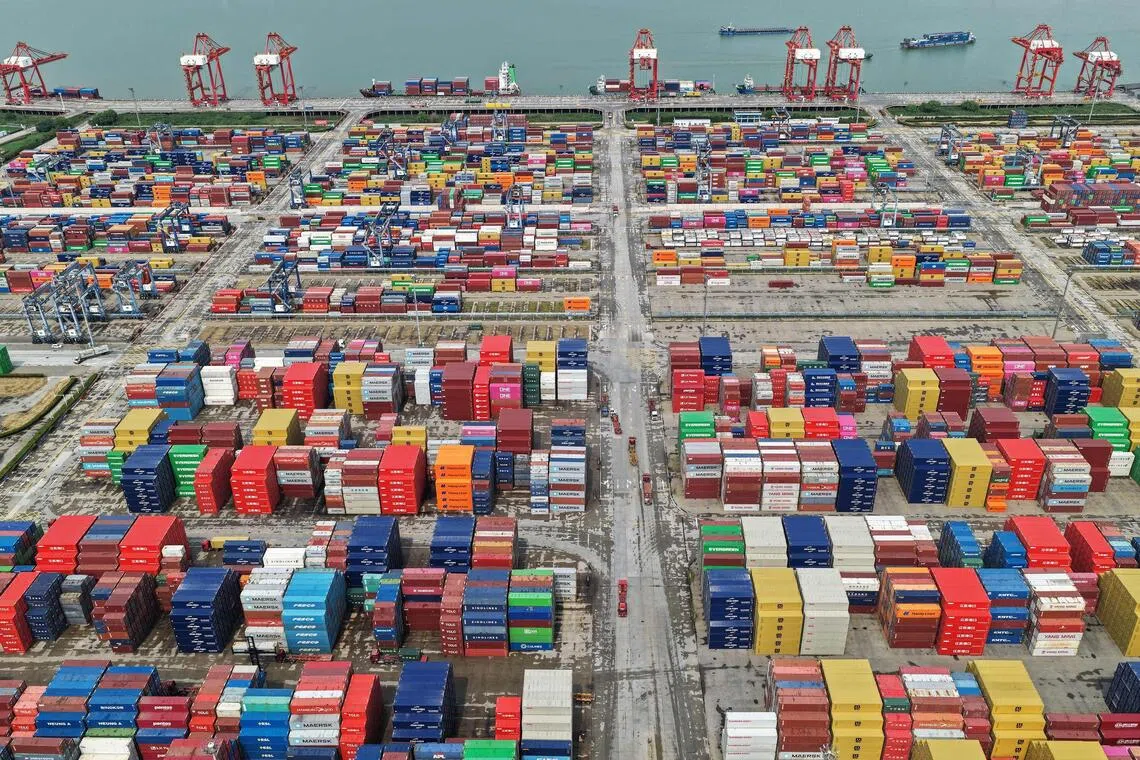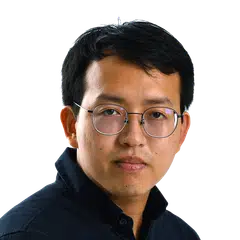China to forgo WTO developing-nation benefits, casting itself as a ‘defender’ of free trade
Sign up now: Get insights on Asia's fast-moving developments

China’s move comes as the US, under President Donald Trump, has been perceived as walking away from the global free trade system.
PHOTO: AFP
- China pledges to forgo developing-country benefits at the WTO, aiming to strengthen its position as a "defender" of the international trading system.
- This move contrasts with the US, which China wants to portray as "unreliable" and blatantly flouts trade rules.
- One analyst believes that it is making this move now as a goodwill gesture to facilitate US-China negotiations.
AI generated
BEIJING – China’s pledge to no longer seek developing country benefits in the World Trade Organisation (WTO) is meant to strengthen its claim as a “defender” of the international rules-based trading system that seeks to facilitate free trade, said analysts.
Chinese Premier Li Qiang announced the move at a UN meeting in New York on Sept 23, saying that as a major responsible developing country, China will not seek access to new special and differential treatment (SDT)
The meeting, hosted by China, was attended by UN Secretary-General Antonio Guterres, WTO Director-General Ngozi Okonjo-Iweala and leaders from developing countries such as Kazakhstan, Angola, Pakistan and Iraq.
WTO members can declare themselves as “developed” or “developing”. The latter status allows countries to enjoy SDT benefits such as longer timeframes to implement trade commitments or more favourable trading terms.
China’s move comes as the US, under President Donald Trump, has been perceived as walking away from the global free trade system it once championed by imposing unilateral tariffs, which are considered illegal under WTO rules.
Mr Stephen Olson, a visiting senior fellow at Singapore’s ISEAS – Yusof Ishak Institute specialising in international trade, said China’s move is meant to strengthen its credibility as Beijing tries to position itself as a “defender” of the international rules-based, free trade system.
“It also draws a sharp contrast with the US, which China is trying to paint as an erratic and unreliable partner that blatantly flouts trade rules,” he told The Straits Times.
China has likely concluded that giving up seeking access to SDT in current and new WTO agreements would not significantly circumscribe its ability to provide those subsidies that are most meaningful either to its developmental or strategic goals, said Mr Olson. “I would not expect to see some massive scaling back in China’s subsidy programmes as a result of this decision.”
China’s large-scale subsidies to its domestic industries, from steel to electric vehicles, have been a source of tension with other countries. The US has contended that some of these subsidies are illegal under the WTO.
However, China was quick to stress that its latest move did not mean its self-designated status as a developing country – key to Beijing’s positioning as the leader of the Global South – has changed.
Mr Li Chenggang, China’s international trade representative with the Ministry of Commerce, told reporters on Sept 23 that the move was an important step for China to uphold the multilateral trading system, which is facing “serious challenges” such as hegemonism and unilateralism.
China remains the world’s largest developing country, and its status and identity as a developing country have not changed, he stressed. “China has always been a member of the Global South and will always stand with developing countries.”
Professor Henry Gao from the Singapore Management University, who has researched China’s role in the WTO, believes that it is making this move now as a goodwill gesture to facilitate US-China negotiations, as well as to pre-empt renewed US efforts to press the issue.
Washington has, in recent years, said there could be no meaningful WTO reform until China and other major economies relinquish the SDT granted to developing countries, which the US says gives them an unfair advantage. China’s announcement to stop seeking WTO benefits tied to its status as a developing country comes after months of trade tensions between the world’s two largest economies over sweeping tariffs imposed by the US and retaliatory measures by China.
Prof Gao noted in a post on X that the latest move does not mean China will relinquish its existing SDT rights, including those secured during its WTO accession in 2001, such as capping its subsidies for farmers to 8.5 per cent of the value of its total agriculture production.
This is higher than the 5 per cent for developed countries but lower than the 10 per cent for most developing countries.
Western countries, notably the US and the European Union, have in recent years called for China to give up those rights, as bilateral trade frictions have increased with China seeking to move up the value chain.
At the WTO’s ninth review of China’s trade policy in July 2024, the EU ambassador to the WTO, Mr Joao Aguiar Machado, had called for China to commit to refraining from claiming WTO developing country status in the future to ensure that “real developing countries” benefit from the SDT provisions.
Other countries have made similar moves. In 2019, South Korea said it would give up its developing country status at the WTO, a status it had adopted to protect its agriculture industry.
Professor Wang Yiwei from Renmin University in Beijing said China’s move was aimed at pushing forward WTO reform, which has stalled in recent years, as well as domestic economic reform towards higher-quality growth.
China is also responding to the international community’s calls for the country to achieve a greater level of opening up in its economy, he added.
Asked if the latest move meant that China was now becoming more confident of its economic prowess, Prof Wang said: “(To no longer seek these benefits) is the natural thing to do. In the (upcoming) 15th five-year plan, China is aiming to overcome the middle-income trap and become a developed country.”



